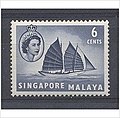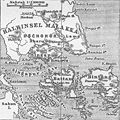Portal:Singapore
 Map of Singapore Singapore, officially the Republic of Singapore, is an island country and city-state in maritime Southeast Asia. It is about one degree of latitude (137 kilometres or 85 miles) north of the equator, off the southern tip of the Malay Peninsula, bordering the Strait of Malacca to the west, the Singapore Strait to the south along with the Riau Islands in Indonesia, the South China Sea to the east, and the Straits of Johor along with the State of Johor in Malaysia to the north. The country's territory comprises one main island, 63 satellite islands and islets, and one outlying islet; the combined area of these has increased by approximately 25% since the country's independence as a result of extensive land reclamation projects. It has the third highest population density of any country in the world, although there are numerous green and recreational spaces as a result of urban planning. With a multicultural population and in recognition of the cultural identities of the major ethnic groups within the nation, Singapore has four official languages: English, Malay, Mandarin, and Tamil. English is the common language, with exclusive use in numerous public services. Multi-racialism is enshrined in the constitution and continues to shape national policies in education, housing, and politics.
Singapore's history dates back at least eight hundred years, having been a maritime emporium known as Temasek and subsequently a major constituent part of several successive thalassocratic empires. Its contemporary era began in 1819, when Stamford Raffles established Singapore as an entrepôt trading post of the British Empire. In 1867, Singapore came under the direct control of Britain as part of the Straits Settlements. During World War II, Singapore was occupied by Japan in 1942 and returned to British control as a separate Crown colony following Japan's surrender in 1945. Singapore gained self-governance in 1959 and, in 1963, became part of the new federation of Malaysia, alongside Malaya, North Borneo, and Sarawak. Ideological differences led to Singapore's expulsion from the federation two years later; Singapore became an independent sovereign country in 1965. After early years of turbulence and despite lacking natural resources and a hinterland, the nation rapidly developed to become one of the Four Asian Tigers. With its growth based on international trade and economic globalisation, it integrated itself with the world economy through free trade with minimal trade barriers and tariffs, export-oriented industrialisation, and the large accumulation of received foreign direct investments, foreign exchange reserves, and assets held by sovereign wealth funds. As a highly developed country, it has one of the highest GDP per capita (PPP) in the world. Identified as a tax haven, Singapore is the only country in Asia with a AAA sovereign credit rating from all major rating agencies. It is a major aviation, financial, and maritime shipping hub and has consistently been ranked as one of the most expensive cities to live in for expatriates and foreign workers. Singapore ranks highly in key social indicators: education, healthcare, quality of life, personal safety, infrastructure, and housing, with a home-ownership rate of 88 percent. Singaporeans enjoy one of the longest life expectancies, fastest Internet connection speeds, lowest infant mortality rates, and lowest levels of corruption in the world. Singapore is a parliamentary republic in the Westminster tradition of unicameral parliamentary government, and its legal system is based on common law. While the country is de jure a multi-party democracy with free elections, the government under the People's Action Party (PAP) wields widespread control and political dominance. The PAP has governed the country continuously since full internal self-government was achieved in 1959, and holds a supermajority in Parliament. One of the five founding members of ASEAN, Singapore is also the headquarters of the Asia-Pacific Economic Cooperation Secretariat, the Pacific Economic Cooperation Council Secretariat, and is the host city of many international conferences and events. Singapore is also a member of the United Nations, the World Trade Organization, the East Asia Summit, the Non-Aligned Movement, and the Commonwealth of Nations. (Full article...)Selected article -The "Double Tenth incident" (双十節事件 Sōjūsetsu jiken) or "Double Tenth massacre" occurred on 10 October 1943, during the Second World War Japanese occupation of Singapore. The Kenpeitai—Japanese military police—arrested and tortured fifty-seven civilians and civilian internees on suspicion of their involvement in a raid on Singapore Harbour that had been carried out by Anglo-Australian commandos from Operation Jaywick. Three Japanese ships were sunk and three were damaged, but none of those arrested and tortured had participated in the raid, nor had any knowledge of it. Fifteen of them died in Singapore's Changi Prison. After the war ended, twenty-one of the Kenpeitai involved were charged with war crimes. Eight received the death sentence, seven were acquitted, and the remainder were given prison sentences varying from one year to life. (Full article...)Selected picture Bedok Reservoir (Chinese: 勿洛蓄水池; pinyin: Wùluò Xùshuǐchí) is a reservoir located in the eastern part of Singapore, to the north of Bedok New Town. The reservoir has a surface area of 880,000 m², and a capacity of 12.8 million m³. The mean depth of the reservoir is 9 m, with a maximum depth of 18.2 m. The shoreline length is 4.3 km. Read more... General imagesThe following are images from various Singapore-related articles on Wikipedia.
Selected biography -Zubir Said SK BBM (22 July 1907 – 16 November 1987) was a Singaporean composer most notable for composing the national anthem of his country, "Majulah Singapura" – "Onward Singapore". A self-taught musician, Zubir also worked as a score arranger and songwriter for Cathay Organisation's Keris Film Productions for 12 years, composing numerous songs for the company's Malay Singaporean films. He is believed to have written up to 1,500 songs, with less than 10% of them ever recorded. (Full article...)Did you know (auto-generated)
In this month
More did you know -
Selected panoramaA panoramic view of the roads and harbour in Singapore in the 1870s Singapore topicsRelated portalsSoutheast Asia Other Countries Tasks
CategoriesWikiprojectsAssociated WikimediaThe following Wikimedia Foundation sister projects provide more on this subject:
Discover Wikipedia using portals |






























































